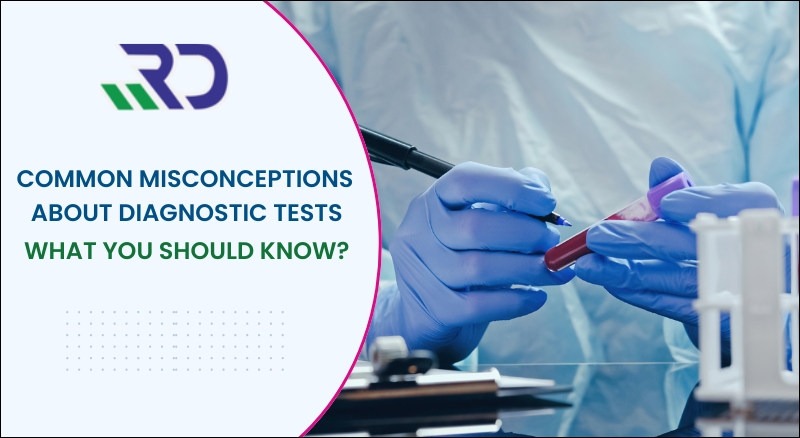Common Misconceptions About Diagnostic Tests
Diagnostic tests are a cornerstone of modern medicine, providing crucial insights into our health. From routine blood work to advanced imaging scans, these tools help doctors prevent, diagnose, and manage conditions. However, widespread misconceptions can lead to unnecessary anxiety, skipped appointments, or misinterpreted results.
Some of the most common diagnostic test myths.
Myth 1: “No News is Good News” – If You Don’t Hear Back, Your Results are Fine.
This is one of the most dangerous assumptions. What you should know: While many labs and diagnostic centers do follow a “no news is good news” policy for perfectly normal results, this is not a universal rule. Human error, such as a misplaced phone number or an incorrect address, can happen. Always proactively follow up with your doctor or the diagnostic center if you haven’t received your results within the promised timeframe. Your health is your responsibility.
Myth 2: A “Normal” Result Means You Are 100% Healthy.
Seeing the word “normal” on a lab report is reassuring, but it doesn’t paint the full picture. What you should know: “Normal” reference ranges are based on averages from a large population. Your individual health status is unique. A result within the normal range might not be optimal for you, especially if you have a pre-existing condition. Furthermore, some tests have limitations and cannot detect every possible issue. Always discuss your results in the context of your symptoms and overall health with your physician.
Myth 3: All Diagnostic Tests are 100% Accurate.
We wish this were true, but no test is infallible. What you should know: Test accuracy can be influenced by many factors, including the sensitivity of the equipment, the skill of the technician, and even how a sample is handled. False positives (the test indicates a problem when there isn’t one) and false negatives (the test misses an existing problem) are possible. This is why doctors often use a combination of tests and clinical evaluation to form a diagnosis.
Myth 4: Fasting for a Blood Test Just Means Skipping Food.
If your doctor asks you to fast, it’s not just about solid food. What you should know: Fasting typically means no food, sugary drinks, gum, or smoking. Even black coffee can interfere with certain tests. Consuming anything other than water can trigger metabolic processes that skew your results, particularly for tests like blood glucose and triglycerides. Always follow the specific fasting instructions provided by your diagnostic center to ensure accuracy.
Myth 5: More Testing Always Means Better Healthcare.
Undergoing every test available might seem like a thorough approach, but it’s not always medically justified. What you should know: Unnecessary testing can lead to false positives, which then trigger a cascade of even more invasive and anxiety-inducing procedures. It also adds to healthcare costs. Trust your doctor to recommend tests based on your specific risk factors, symptoms, and medical history.
Choosing the Right Diagnostic Center for Your Health
Understanding the realities of diagnostic testing empowers you to be an active participant in your healthcare. The accuracy of your results heavily depends on the quality of the diagnostic center you choose.
Raaya Diagnostic Center stands as a leading diagnostic center in Moshi, we are committed to debunking myths by providing transparent, accurate, and reliable services. Equipped with latest technology and staffed by experienced radiologists and technicians, we ensure every test is performed with precision and care.
Frequently Asked Questions (FAQs)
1. What can cause a false positive in a diagnostic test?
Human error, cross-reactivity with other substances, certain medications, or an underlying health condition unrelated to the one being tested for can all lead to a false positive result.
2. How long do blood test results usually take?
Turnaround time varies. Simple tests can take a few hours, while more complex cultures or specialized tests can take several days. Your diagnostic center will provide an estimated timeline.
3. Can I drink water before a fasting blood test?
Yes, in most cases, drinking plain water is encouraged before a fasting blood test as it helps keep you hydrated and makes it easier to draw blood.
4. What is the difference between a screening and a diagnostic test?
A screening test checks for potential health issues in people with no symptoms (e.g., mammogram). A diagnostic test is used to confirm or rule out a specific condition after symptoms or a positive screening.
5. Why do different labs have different reference ranges?
Labs can use different equipment, reagents, and testing methodologies, leading to slight variations in what is considered a “normal” range. Always compare your results to the reference range provided by the specific lab that processed them.

